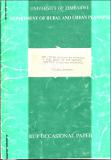| dc.contributor.author | Butcher, Colleen | |
| dc.coverage.spatial | Zimbabwe. | en |
| dc.date.accessioned | 2016-03-14T11:25:14Z | |
| dc.date.available | 2016-03-14T11:25:14Z | |
| dc.date.issued | 1986-11 | |
| dc.identifier.citation | Butcher, C. (1986) Low income housing in Zimbabwe: a case study of the Epworth squatter upgrading programme, RUP Occasional Paper No. 6, UZ, Mt. Pleasant, Harare: RUP. | en |
| dc.identifier.uri | https://opendocs.ids.ac.uk/opendocs/handle/20.500.12413/10008 | |
| dc.description | A research paper on the provision of low income housing in Zimbabwe. | en |
| dc.description.abstract | The provision of domestic shelter is an important basic need to be met in any country(l). However this provision is a complex process involving issues not only of/providing physical shelter in adequate quantities to house the population, but also of providing appropriate shelter types within a total urban environment i.e. shelters which are capable of meeting diverse physical, social and even psychological needs of households, bearing in mind that these needs change over time as a particular household's composition changes (as it forms, grows and then dissolves). Compounding these multiple concerns is the additional problem of how to provide sufficient, appropriate shelter types at levels which are affordable by all, particularly the urban poor who typically constitute fifty per cent or more of Third World city populations.
In section 2 of this paper I will attempt to examine these theoretical issues in some depth and in section 3 I examine shelter policies affecting low income households in Harare. Here I argue that whilst the physical standard of dwelling units and service infrastructure is high, there are serious deficiencies in the provision of adequate numbers of units, in the provision of choice in types of units available and, most importantly, that the housing provided by the authorities is well above the economic means of large numbers of urban dwellers. The emergence of squatter settlements in and around Harare's municipal boundaries, despite strictly enforced development control measures, must be seen as a response by the urban population to these inadequacies. | en |
| dc.language.iso | en | en |
| dc.publisher | Department of Rural and Urban Planning, UZ. | en |
| dc.relation.ispartofseries | RUP Occasional Paper;6 | |
| dc.rights.uri | http://creativecommons.org/licenses/by-nc-nd/3.0/ | en |
| dc.subject | Development Policy | en |
| dc.subject | Population | en |
| dc.subject | Social Protection | en |
| dc.title | Low income housing in Zimbabwe: a case study of the Epworth squatter upgrading programme | en |
| dc.type | Series paper (non-IDS) | en |
| dc.rights.holder | University of Zimbabwe (UZ) | en |


